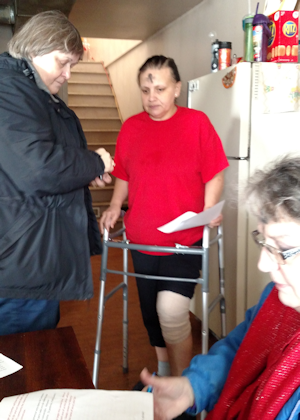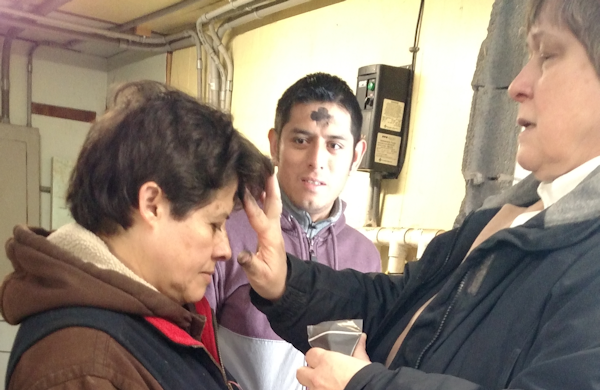ST. JOHNS, Michigan (MIC) The cattle are lowing, the baby awakes. Sounds like Christmas Eve in Bethlehem, doesn’t it? Well, it was Ash Wednesday in mid-Michigan.
Ellen Zienert, pastor of St. Johns First United Methodist Church, Heartland District, describes the experience as a “reverse drive-in” imposition of ashes on the first day of Lent 2016.
Ellen and four members of the congregation indeed drove out into the Clinton County countryside traveling a circuit of 75 miles. On the course of their six and half hour journey, they visited ten farms and shared ashes with 26 people (ten more than attended the worship service in the church that same evening).
February 10 was a school day but the effort was still multi-generational, blessing babies, pre-schoolers, workers and seniors. Many of the church’s neighbors in the Hispanic-Latino community are employed in the dairy industry. Most work with the cows and others support the effort with food preparation for the farmhands.

The language of love was at the center of this spiritual engagement. St. Johns is participating in the “Who is My Neighbor? Challenge” from the Michigan Area Committee on Hispanic-Latino Ministries. The challenge was an invitation to six-weeks of Spanish language study during Lent.
The five women sharing ashes were all members of the class at St. Johns. Two of them—Ellen Zienert and Patsy Coffman—are proficient in Spanish. Diana, Kim and Fran are learning. There are a total of twelve in class but not all were able to participate in the Ash Wednesday ministry.
Ellen prepared a liturgy in Spanish and class members practiced before the Ash Wednesday trip. Those receiving ashes joined in a unison prayer and everyone said the Lord’s Prayer together. “Fran’s role that day was to say, ‘Dios te bendiga’ (‘God bless you’),” Ellen explains. “We all had a wonderful time.”
She especially remembers one man, possibly the farm owner, who did not wish to receive ashes but who asked if he could simply be a quiet presence in the worship.
St. Johns First has had an active Neighbors Program for several years. It is described as “a ministry with new immigrants to the community that includes English language classes, advocacy, transportation, and translation service.” They estimate that the program reaches 80-100 people on an ongoing basis.
The Neighbors Program Team attended a Pentecost Journey, another offering of the Michigan Area Committee on Hispanic-Latino Ministries. “During the training we came up with a new vision,” Ellen says. “St. Johns First UMC is the heart of Hispanic-Latino Ministry in mid-Michigan.” That vision is helping us to focus. It was during an exercise at Pentecost Journey that the idea emerged for Ash Wednesday.
“They asked us to put all of our churches activities in one basket,” Ellen notes, “and all the locations in our community in another basket.” When the random drawing occurred at their table, “Ash Wednesday” came out of one basket and “at the farm” come out of the other. The St. Johns team was immediately excited about Ash Wednesday at the Farm.
Departing each farm, the group was invited to return next year. “It is my hope to have two teams in 2016 that can serve 20 sites,” Ellen says with enthusiasm. Some whom they met in the barns and houses were familiar faces at other St. Johns First events like Cinco de Mayo or English Class. Others were new and they received a postcard listing the various Neighbors Program ministries.

The next event being planned for March is called “Breaking Bread and Barriers.” The public will be invited to St. Johns for food and a panel discussion about immigration. “We intend for this to be an opportunity for people to engage with others and with issues in a calm and respectful way,” Ellen shares. “It will also be a time to talk about fears.”
Rev. Zienert has been at St. Johns for three and a half years. “When the appointment was made, the D.S. told me the church had a ministry to migrant workers but didn’t know I spoke Spanish,” she reflects. “God is always at work.” Ellen has advice for others who live among Hispanic-Latino neighbors. “Don’t be afraid! Just look around you with different eyes.”
Ellen reminds people to think creatively about the gifts they have to offer. “Your driver’s license is a gift to a person who doesn’t have one,” she explains. “Give that person a ride.” Helping Spanish speaking parents interact with the school their children attend is a special blessing to consider. “Brush off your high school Spanish and reach out,” she suggests, “to Moms and Dads who want to help their kids do well.” She says Spanish proficiency is simply not necessary. “That’s what dictionaries are for!” Rev. Zienert concludes.
~by Kay DeMoss, Senior Editor-Writer, Michigan Area
Last Updated on December 15, 2023

